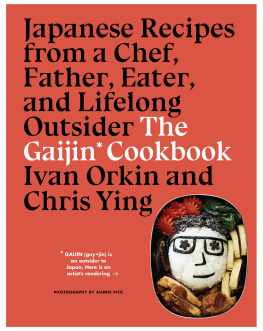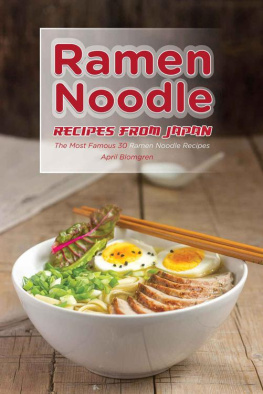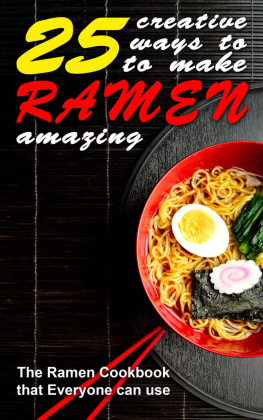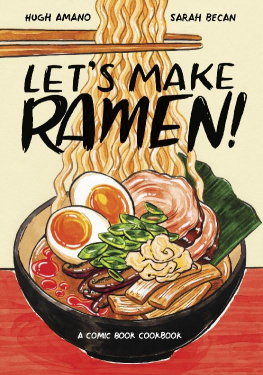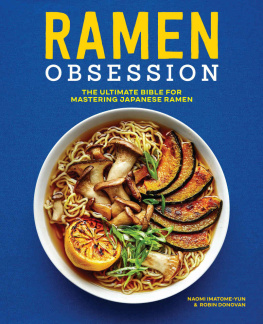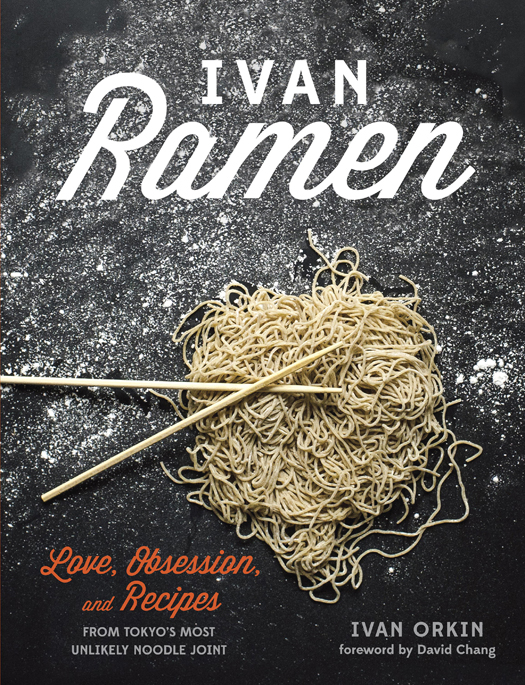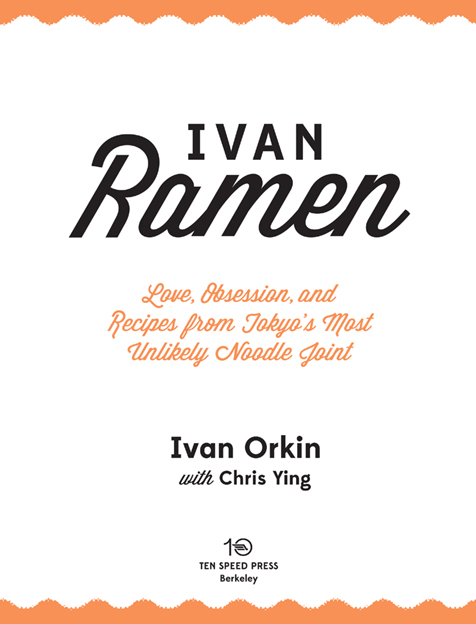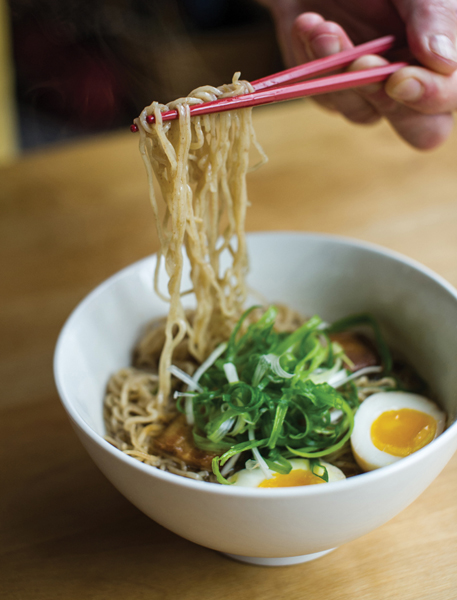Copyright 2013 by Ivan Orkin
All rights reserved.
Published in the United States by Ten Speed Press, an imprint of the Crown Publishing Group, a division of Random House, Inc., New York.
www.crownpublishing.com
www.tenspeed.com
Ten Speed Press and the Ten Speed Press colophon are registered trademarks of Random House, Inc.
Photographs on by Daniel Krieger, copyright 2013 by Daniel Krieger
Photographs by Noriko Yamaguchi
Photographs from Ivan Orkin
Photographs
Photograph by Chris Ying
Library of Congress Cataloging-in-Publication Data is on file with the Publisher
Hardcover ISBN: 978-1-60774-446-7
eBook ISBN: 978-1-60774-447-4
Illustrations by Walter Green
v3.1
This book is dedicated to my father, Leonard Orkin, who
died suddenly on February 1, 2013, shortly before its
completion. He was the source of so much inspiration,
and my inability to share this book with him leaves
me deeply saddened. His presence is in these pages and
in my heart. Like any great father, he prepared me for
all the challenges Ive met over the years. My success
is his. Although at times it must have seemed that
I heard not a word he said to me, I was always listening
very carefully. Thanks, Dad. This books for you.
Foreword
Hey Ivan!
First off, congratulations onand thank you forthis book. Back when I was a twenty-nothing noodle-slurping lost sheep wandering from ramen shop to ramen shop, trying to decode the secrets of the soup, there was nothing like this in English, or maybe in any language. There is so much essential, indispensible information here for readers who want to learn something about ramen beyond the instructions on the side of the Styrofoam bowl. And then theres your story, which is beyond remarkable: I couldnt get a job in a decent shop when I was in Japan. Youve broken through the ramen barrier in Tokyo, put your name on the map. Incredible.
And now youre going to open a shop in New York! Well, let me be the first to congratulate you on a terrible decision. Heres the best advice I can give you about trying it back home:
1. Do you know the classic 1992 Wesley SnipesWoody Harrelson buddy basketball movie White Men Cant Jump ? Of course you do! What you might not know is that your next year is going to be an infinite loop of a sad variation of that film: White Men Cant Eat Ramen .
When you put a hot bowl of ramen in front of most Americanswhite or otherwisethey will wait for it to cool down. It defeats the purpose, but they do not know this. Its the equivalent of ordering a burger, and then when it comes, you dont touch it! You wait for it to cool down, the lettuce to wilt, the cheese to congeal.
Americans think its rude to slurp noodles. They have no concept that the noodles are continuing to cook in the soup. They have no concept that they should drink the soup first. And they will think the soup is too salty! They dont understand that the soup is part of the noodles.
I know this. Ive seen thousands and thousands of bowls at Momofuku. People have been leaving behind noodles before it was cool to be gluten free.
These will be your customers!
2. Prepare to compromise.
Ive been to ramen shops in Tokyo. Itd be nice to serve sixty people a day in a twenty-seat restaurant, two bowls at a time. You wont be able to do it like that here. The economics of New York are different.
While you can sell ramen relatively expensively in Japan, you cant do it in America. People will unblinkingly pay $20 a plate for spaghetti pomodorowhich is just canned tomatoes and boxed pastabut they will bitch to the high heavens about forking over $20 for a bowl of soup that requires three or four or five different cooked and composed components to put together. Plus, you will rake yourself over the coals looking for ingredients that even approximate what you can buy down the alley from your shop in Tokyo.
Youll have to find a way to make food faster, and that means doing some things that may be sacrilegious in Japan. Youve gotta make the compromise between having the soup hot, but not so hot that people cant eat it. If you serve dishes with ramen, its going to slow the experience down. People will have a conversation instead of eating. Thats the main difference. In Tokyo, if you go to a really good ramen-ya, you hear nothing but slurping. In New York, people want to chat over their soup! It is unthinkable to those of us who have prayed at the altars of the ramen gods, but it is a reality you must confront.
3. Get ready for the most ridiculous complaints ever known to mankind.
You should shave your head now so that you have no hair to pull out when the Internet gets revving on you.
Get ready for criticism from the whole Asian demographic. Half the food bloggers in the world are Asian women. Youre going to be their bread and butter. Theyre going to laugh at you and yell at you. They will be upset that your food isnt authentic or that its not Japanese enough.
White people will say, Ive lived in Japan, and this isnt authentic. Youre never going to have seen so many people express their feelings. Everybody is going to have their opinion on what Japan is. They may not have been to Japan, but you know what? They might have dated somebody from Japan.
People are going to look at you like this weird thing, like the Eminem of ramen. I can almost get away with doing ramen because Im Asian. Youre probably fucked.
Fifty percent of people will be cheering for you, and the other 50 percent will want you dead. Get ready to accept that people hate you and want nothing but your demise. Use it as fuel.
4. Its like in Band of Brothers when the guy says, The only hope you have is to accept the fact that youre already dead.
When I opened up, people in New York didnt know anything about ramen at all. The funny thing is, people know even less about ramen today. New York is so far behind the world of contemporary ramen in Japana world I cant quite fathom how you conquered or why youre leaving.
What I originally loved about ramen shops in Japan was that it was a whole fascinating world. I can eat something really delicious for ten or fifteen bucks. Its exactly like going to In-N-Out and knowing the secret menu. Once youre in the know, everythings good. You know what to order.
What drew me to cooking ramen wasand I hate to use this termthe punk aesthetic. It was a contrarian stance. You take something deemed by the world as junk food and pour passion into it, and make it the most delicious food possible. In that conflict is what I love about ramen. At the end of the day, its just soup and noodles. Its one of the simplest forms of food, but also the most beloved. And of course you know that. Youre making Jewish comfort food through a Japanese lens.
And down there on the Lower East Side, where Jewish chicken soup has roots more than a century old, you will slowly build an audience that understands your soup.


